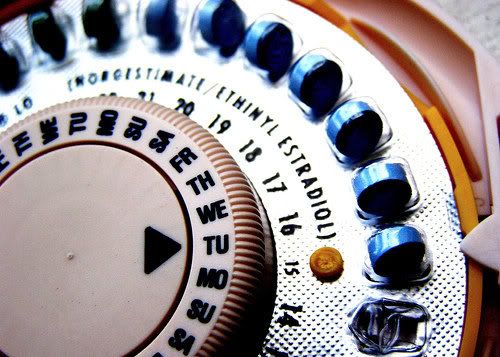Contraception's been in the news lately. Which is so weird. I mean, it's the 21st century! We have iPhones and robotic surgery and Roombas and Segways! How is this even a thing?
In a sense, it's not. The real issue is "will religious organizations be required to include free contraception in their healthcare plans?" which while still an important issue, isn't at all the same thing as "should contraception even exist?" And yet it seems to have drawn all the creeps who want to yell "contraception shouldn't exist because SLUTS!" out of the woodwork anyway.
I don't want to expound too much on how I feel about this, because I think it's pretty obvious where I stand. You think I'm going to spring the anti-birth-control stance on you here? Seriously.
So instead, I'm going to expound on some relatively little-known, and hopefully useful, facts about birth control.
1. You can use regular birth control pills as an emergency contraceptive.
If you have access to birth control pills but not Plan B, you can take extra pills to prevent pregnancy after having unprotected sex. Here's a table of the correct dosages. This is not an abortion method and won't stop an implanted pregnancy, but it's effective for more than just the "morning after"--although sooner is better, emergency contraception can work up to five days after unprotected sex. (It also doesn't appear to cause any birth defects, so if it doesn't work, keeping the pregnancy and having a healthy child is still an option.)
2. You're probably paying too much for condoms.
Drugstore prices are highway robbery. (Or at least highway rubbery.) $15 for a package of 12? Maybe $10 for the crappy brand? Yep, still cheaper than diapers, but you can do way better than that.
If you have a credit card and a mailing address, you can buy a giant bag of 100 for less than $19 here. I can personally vouch for that brand being reliable and comfortable on the vagina side, and I've gotten good reports on the comfort for the penis side. I can't vouch for these, but they're even cheaper--under $14 for 100. At that price, you can afford to have sex and make ballon animals.
3. "Pulling out" works better than you think.
Withdrawal has a bad reputation; most people think it's more of a bad joke than a birth control method. But actually, if it's done correctly, it works better than a sponge or a diaphragm. Interruptusing your coitus is 96% effective over the course of a year--if you do it right.
That's the catch, though. Pulling out is trustworthy; penises often are not. And if you have an "oh oh OHHHHH oh shit" moment, or if there's residual sperm in the urethra, your risk of pregnancy goes up to 27% over the course of a year. (You can remove residual sperm from your urethra by always peeing before sex and after any time you ejaculate.) So I don't really recommend this method--except that it is by far the most effective method that requires no money, no drugs, no trips to the doctor or drugstore, no pre-planning. All you need is your bodies (and some trust and ejaculatory control). It's not the best birth control method, but it's the best one that you can do entirely on your own.
Note: I am not advising you to rely on withdrawal for contraception. It is not a very good idea. It provides no protection from STIs and 27% is not great odds. Condoms can be gotten for free or dirt cheap and they protect you from infection as well as being much more effective protection against pregnancy.
4. Spermicide is way, way, worse than you think.
The pregnancy rate (over a year) with typical use of spermicidal foam/jelly/film is 29%. That's not great odds. It's certainly better than nothing (85% risk), but it's worse than condoms (15% typical risk), worse than the pill (8% typical risk), worse than the rhythm method (25% typical risk), even slightly worse than pulling out!
Also, if you have a vagina, using spermicide can put your health at risk. The most common spermicide is nonoxynol-9, which has been found to increase the risk of HIV, HPV, trichomonas, and vaginosis infections. Sex workers are 50% more likely to contract HIV if they use nonoxynol-9. And the reason is nasty--because it can cause ulcers to form in your vagina, which creates open wounds for infection to enter.
As pregnancy prevention, spermicide is crappy, but better than nothing; as infection prevention, spermicide is actually worse than nothing.
5. If you're on birth control pills, you don't get a period.
It certainly seems like you do, at least if you're on the 28-day-cycle kind of pill. But the "period" you get between pill cycles is not a period at all--it's withdrawal bleeding from the change in hormone levels. Unlike a true period, there's no uterine lining buildup and no egg in it. It doesn't perform any cleaning or renewing function. It's just bleeding.
So why do pretty much all conventional (and the most affordable) birth control pills make you bleed every month, if it doesn't serve any purpose? The answer pretty much comes down to "tradition." "Normalcy." I've heard claims it gives users "a sense of well-being," which is slightly hilarious. Confirmation you're not pregnant--I guess that's nice-ish, but is it really worth a week's worth of cramps and stained underpants? Ultimately, I might have to chalk this one up to "male doctors."
So calling Lybrel "the birth control where you don't have periods" isn't quite right. Hormonal methods all stop you from getting a period. Lybrel is really "the birth control where they don't make you bleed for no reason."
Saturday, 3 March 2012
Subscribe to:
Post Comments (Atom)

0 comments:
Post a Comment